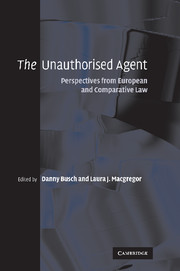Book contents
- Frontmatter
- Contents
- List of contributors
- Foreword
- Preface
- Abbreviations
- Table of cases
- 1 Introduction
- PART 1 The civilian legal systems
- 2 Unauthorised agency in French law
- 3 Unauthorised agency in Belgian law
- 4 Unauthorised agency in German law
- 5 Unauthorised agency in Dutch law
- PART 2 The common law
- PART 3 Mixed legal systems
- PART 4 International ‘codes’
- PART 5 Conclusions
- Bibliography
- Index
5 - Unauthorised agency in Dutch law
Published online by Cambridge University Press: 07 September 2009
- Frontmatter
- Contents
- List of contributors
- Foreword
- Preface
- Abbreviations
- Table of cases
- 1 Introduction
- PART 1 The civilian legal systems
- 2 Unauthorised agency in French law
- 3 Unauthorised agency in Belgian law
- 4 Unauthorised agency in German law
- 5 Unauthorised agency in Dutch law
- PART 2 The common law
- PART 3 Mixed legal systems
- PART 4 International ‘codes’
- PART 5 Conclusions
- Bibliography
- Index
Summary
Introduction
Under Dutch law, unauthorised agency arises when a person (the ‘agent’) concludes a contract with a third party in the name of someone else (the ‘principal’) without (sufficient) authority. The general effect is that neither the principal nor the third party is bound or entitled under a contract so concluded. This rule is not applied in cases where the third party successfully invokes the doctrine of apparent authority or where the principal subsequently ratifies the unauthorised act. Furthermore, in the case of unauthorised agency the third party may hold the unauthorised agent (the falsus procurator) liable for the damage which he has suffered as a consequence of the agent's lack of authority.
In this chapter, in part II, I first examine the distinction between direct and indirect agency. In part III, I devote some attention to the nature and general effect of unauthorised agency. I then turn to the main exceptions to the general effect of unauthorised agency: apparent authority (part IV) and ratification (part V). Part VI follows with some comments on the liability of the falsus procurator and part VII with a treatment of the interrelationship between apparent authority, ratification and the liability of the falsus procurator. Parts VIII and IX each elaborate on a special case which can be associated with unauthorised agency, namely acting in the name of a principal yet to be named and acting in the name of a company yet to be incorporated.
- Type
- Chapter
- Information
- The Unauthorised AgentPerspectives from European and Comparative Law, pp. 136 - 182Publisher: Cambridge University PressPrint publication year: 2009
- 1
- Cited by

